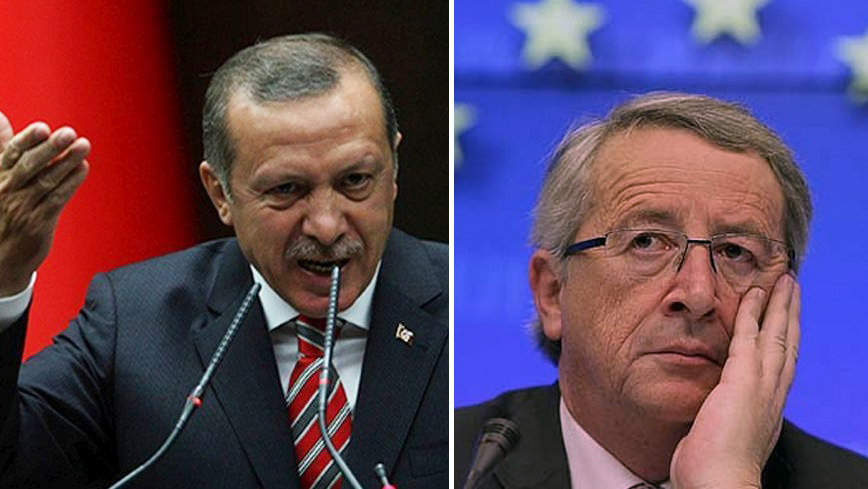The elites and intellectuals are apparently now counted among the German minorities in need of protection.
Toward the end of last year, Germany experienced a previously unheard-of boycott campaign – funded by the German government, no less — against several websites, such as the popular “Axis of Good” (“Achse des Guten“). The website, critical of the government, was suddenly accused of “right-wing populism”.
The German government’s efforts at thought control seem to have begun with the victory of Donald J. Trump in the US presidential election — that seems to set the “establishment” off. Germany’s foreign minister and the probable future federal president, Frank-Walter Steinmeier — one of the first to travel to Iran after the removal of sanctions there to kowtow to the Ayatollahs — called America’s future president a “hate preacher“.
Germany’s newspapers were suddenly littered with apocalyptic predictions and anti-American fulminations.
For hard-core Trump-haters, however, a witch hunt by itself is insufficient; they want activism! Since November, Germany’s left-wing parties have had a strong increase in membership, as reported by Der Spiegel. At the same time, the federal government evidently decided, at least regarding the federal elections taking place in 2017, that it would no longer count on journalists’ self-censorship. The German government, instead of merely hoping that newspapers would voluntarily — or under pressure from the Press Council — refrain from criticising the government’s immigration policies, decided that it, itself, would inaugurate censorship.
The Federal Government’s “Ministry of Truth”
To this effect, as reported by Der Spiegel, the Federal Interior Ministry, intends to set up a “Defense Center against Disinformation (“Abwehrzentrum gegen Desinformation“) in the fight against “fake news on social networks”. “Abwehr” — the name of Nazi Germany’s military intelligence agency — is apparently meant to demonstrate the government’s seriousness regarding the matter.
“It sounds like the Ministry of Truth, ‘Minitrue,’ from George Orwell’s dystopian novel 1984“, wrote even the left-leaning daily, Frankfurter Rundschau.
Frank Überall, national head of the German Association of Journalists (DJV), bluntly stated: “This smells like censorship.”
It seems that all ideas suspected of being “populist” — or simply those ideas without the blessing of the elites – will now be banned in Germany. This restriction applies to criticism of the government (especially regarding immigration and energy policies), of the EU, of Islam, of government officials and of the media.
The Federal Agency for Political Education — the information agency of the Interior Ministry – is quite open about it: “Anti-elitism”, “anti-intellectualism”, “anti-politics” and “hostility toward institutions” are the “key characteristics of populism”.
“Fat, Stupid White Men”
Toward the end of 2016, one of the biggest German media scandals in recent memory erupted when Gerald Hensel, undoubtedly a member of Germany’s elite, tried to introduce a new form of internet censorship with the help of a team of media agencies and political players. Until recently, Hensel was “Director of Strategy” at Scholz & Friends, one of Germany’s two big advertising agencies. The firm counts among its clients multinational corporations such as General Motors, the German federal government and the European Commission; so one might say the company is close to the state.
Apparently in anger over Trump’s election victory, Hensel demanded: “Let us freeze the cash flow of the right-wing extremist media!” He had previously written a strategy brief declaring debate to be useless; instead, the political enemy — the “populists” – needed to be fought, even with questionable methods:
“The liberal center must, especially in these new digital and information-based wars, take off the kid gloves. We have to turn the tables and learn about populism, particularly on the Internet… Thus, we have to respond in a more wide-spread digital manner and with explicitly less sympathy to those people who want to force their own future on us — and do this long before the next federal election… Political storytelling, targeting the political enemy, influencers, forums, rumours…”
“Measures,” he added, have to be taken against the “new right” – measures that:
“are ‘Below the Line’ and also digital. We need ‘good’ troll factories in our fight against Frauke Petry, Beatrix von Storch, Geert Wilders, Marine Le Pen and the fat stupid white men behind them. Ideally, as quickly as possible. Starting in 2017, they will continue to dismantle the EU and thus our future and that of our children.”
Advertising Agency as Thought Police
Toward the end of November, Hensel appealed to his colleagues in various advertising agencies, under the banner of “no money for the right“, to boycott all those who fit the description of his bogeyman — because they were “hostile towards the EU,” or because they might even harbour sympathies for Donald Trump. He was jumping on a bandwagon. A witch hunt was already under way against the American website Breitbart, due to the closeness of its former executive chair, Steve Bannon, to Donald Trump. Without providing any kind of proof, countless German newspapers and broadcasters claimed that Breitbart was “racist”, “sexist”, “xenophobic”, “anti-Semitic” and “Islamophobic”, and a “hate site”. The state-owned German television station ARD described Breitbart as an “ultra right-wing” platform for “white supremacy”. Other journalists followed suit.
Those Not Reading Newspapers are Suspect
Hensel went one step farther. In the style of a prosecutor during the Inquisition, he called to break the “dominance of right-wing micro media”. He seems to consider particularly dangerous and subversive, anyone who reads articles that do not originate from one of Germany’s media empires:
“While I may satisfy my thirst for information with my subscriptions to ZEIT or Le Mode Diplomatique, the brave new-right freedom-fighter likes to stay informed via online media such as the Axis of Good or Breitbart News.”
This alone raises several suspicions. Hensel, whose website (which since December can only be accessed with a password) is graced by the display of a Soviet red star, likes to eliminate his opponents swiftly. Breitbart, for example, is deemed fascist (“salon-fascists”). Why? Because the blog — and here he, supposedly for simplicity’s sake, quotes an article from the Süddeutsche Zeitung — “covers all the topics of German right-wing populism”; Breitbart reports about “the migrant and refugee policies of the German federal government, as well as of supposed criminal acts conducted by migrants and Islamic activities.”
Hensel’s solution? Boycott!
“There is freedom of speech in my stupid little world. Undoubtedly, websites such as Breitbart News and the Axis of Good… are legal media. Nevertheless, one could ask brand names whether they… are aware that their banner ads appear on these particular websites and represent their brand there.”
This type of “asking”, of course, roughly corresponds to the mafia “asking” the pizzeria owner if he has fire insurance.

(Image source for Hensel: Internet Archive screenshot)
|
Alliance for Censorship
Hensel also considerately provided detailed instructions for his readers. Those employed by an enterprise should check whether the websites that he deemed “right-wing” are registered on a blacklist. Employees of advertising agencies should form a team, with Hensel and other authoritarians, for internet censorship:
“If your career in a media agency has propelled you a little higher up the hierarchy, you might be able to bring up the topic at the next media get-together with colleagues. 2017 is an election year. You, dearest colleagues, clearly have a part in determining who receives our advertising dollars.”
Hensel also suggests that consumers put direct pressure on companies or approach them via social media, to dissuade them from advertising on “hate publishers” and “destroyers of the future”.
This manifesto was only published on a private blog — one that barely anyone had ever heard of before. But the power of which Hensel boasted — the networks in the advertising agencies and editorial offices — is real. On Hensel’s command, big newspapers and websites reported on the operation with much sympathy, along with the hashtag #NoMoneyForTheRight.
Companies Submit to Pressure
Large companies such as Deutsche Telekom (T-Mobile), BMW, Mercedes-Benz and the supermarket chain REWE obeyed straightaway, and promised to place “Breitbart” on the blacklist immediately and never to advertise there again. Der Spiegel cited Hensel’s “resistance” (!) and pilloried one business that did not follow suit: A plucky little pizza delivery service that responded to the blacklisting demand by declaring that it was “not the morality police”. The company was denounced by Der Spiegel as “inept”, and after “protests from customers”, it ended up capitulating, as the newspaper reported with much satisfaction.
Breitbart will cope with missing out on a few hundred dollars of advertising revenue from Germany. Hensel, however, was successful in his attempt to motivate his ad agency colleagues against German websites such as the Axis of Good. Within a few days, none of them advertised there anymore. Advertising revenue, equally important for websites as it is for newspapers, came to a halt. Hensel had achieved his goal.
State-Financed Boycott
For this campaign, Hensel also received support from the group Network Against Nazis (“Netz gegen Nazis“), which receives financing from by Germany’s federal government, the German Football Association and the newspaper Die Zeit, and which, until recently, also counted Scholz & Friends among its supporters. In the tried and true Orwellian fashion of calling things their opposite, the definition of “Nazi”, for Network Against Nazis, encompasses anyone who is “Islamophobic” or “hostile toward the media“.
Shortly after Hensel’s call for boycotts, the Axis of Good was place on a list of “popular right-wing blogs” by Network Against Nazis — together with the liberal publisher Roland Tichy and the evangelical civil rights activist Vera Lengsfeld (who is a thorn in the side of communists, because she fought against the East Germany’s dictatorship in the 1980s). The Amadeu-Antonio Foundation, which runs the Network Against Nazis website, receives almost a million euros per year from the federal government. Not surprisingly, it demonstrates its gratitude with character assassinations of critics of the government.
“The Trend of Denouncing People as Right-Wingers”
Within a short time, Hensel had put together a kind of mafia, bent on economically ruining whoever rejected his ideological commands, by using libel and slander to scare away their customers.
As the Frankfurter Allgemeine daily newspaper commented:
“It is very fashionable right now to stigmatize people and denounce them as ‘right-wing’ if they do not share your views. Companies want nothing to do with that label, and, as you can see on Twitter, they quickly change direction if they are aggressively made aware that they support the wrong side with their ads (which are often automatically activated and run on the internet).”
In response to the boycott campaign against it, the Axis of Good showed how a business can defend itself: the editors raised a public alarm about Hensel’s campaign in a series of reports and commentaries. Thousands of readers complained on the Facebook page of Hensel’s employer, Scholz & Friends, which, after its initial support, began to distance itself from its employee’s campaign and finally severed ties with him.
According to Hensel’s version, his campaign was “so successful” that he wanted to take his employer “out of the line of fire”.
“My former employer and I became the victims of a massive hate storm consisting of countless of tweets, emails and comments on social media… This is a systematic campaign.”
Propaganda Offensive ahead of the Federal Election
Of course, it was Hensel himself who initiated a systematic campaign, including dirty tricks, which were waged with an eye to the government’s apparent plans to consolidate the population ideologically. As research by the Axis of Good has revealed, Hensel’s boycott operation was closely tied to the plans by the Federal Ministry of Family Affairs to conduct an advertising campaign in support of an open-door immigration policy in 2017. For this, an advertising agency was necessary, as reported in September by an industry journal:
“As revealed by a Europe-wide announcement, the Federal Minister of Family Affairs, Senior Citizens, Women and Youth is looking for an agency to advertise the brand ‘Living democracy! Actively against right-wing extremism, violence and inhumanity’.”
Ad agencies were invited to submit their suggestions by the middle of December. The Axis of Good concluded:
“There is a suspicion that this [boycott] operation was a hurried pilot project for the bid for the million-euro project by Schwesig’s Family Ministry. A free trial run for the so-called ‘advertising pitch’.”
Regarding the question of how much economic damage was caused to the Axis of Good by the boycott campaign, Henryk M. Broder, the website’s publisher, told Gatestone:
“It is significant, but how big it really was, we will only know in a few months. After all, it is not the companies themselves that stopped advertising, but the agencies. The damage for Scholz & Friends could be even bigger, but they do not talk about it.”
The Hamburger Abendblatt daily referred to Hensel’s campaign as an “attack on the freedom of the press,” adding: “It seems as if the shot from the activists backfired.”
As in communist dictatorships, the more obvious the failings of the government, the more aggressively the establishment attacks those who speak out about them.
Stefan Frank, a journalist and writer, is based in Germany.



































